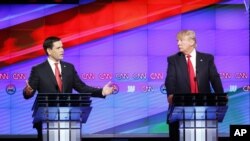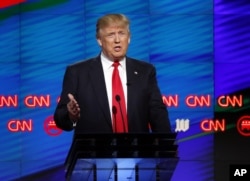Radical Islam, foreign policy and trade were among a range of issues tackled in a mostly civil discourse by the last four Republican presidential candidates in their final debate before next Tuesday's key primary and caucus contests.
In a lengthy discussion of the threat posed by radicalized Muslims, U.S. Republican presidential candidate Donald Trump stood behind his claim that "a lot of" Muslims hate Americans and said he would consider sending up to 30,000 U.S. ground troops to fight Islamic State militants in the Middle East.
Trump was questioned about a statement he had made in an interview this week that "Islam hates us." When asked during the debate whether he was referring to all Muslims, Trump replied, "I mean a lot of them." He said he is not interested in avoiding such statements in the interest of being "politically correct."
Rival Marco Rubio replied sharply, "I'm not interested in being politically correct. I'm interested in being correct." The Florida Senator said the only way to deal with radical Islam is to ally with non-radical people of Muslim faith. And he warned that "Presidents can't just say anything they want, because it has consequences around the world."
Texas Senator Ted Cruz criticized what he called Trump's simplistic solutions on trade and on violent extremism, saying "The answer is not to simply yell 'China bad; Muslim bad.'"
Relations with Cuba also drew sparks, with Rubio and Cruz condemning the warming diplomatic relationship between Washington and Havana.
Rubio listed the conditions under which he would have approved strengthening those ties: "Cuba has free elections. Cuba stops putting people into jail for speaking out. Cuba has freedom of the press." Only under those conditions and several others, including Cuba ending cooperation with Chinese and Russian espionage, he said, should the United States have a relationship with Cuba.
Ohio Governor John Kasich, trailing in the polls, did not engage readily in the bickering but did manage to make a stand on climate change legislation. He said he believes human activity contributes to climate change, but he maintained that it is possible to have strict environmental rules that do not damage the economy.
Rubio answered that no law passed in Congress could change the weather.
This was the final debate among Republican candidates before a day of important state primaries and caucuses next Tuesday. Rubio's home state, Florida, and Kasich's home state, Ohio, are two of the biggest primaries that day, along with North Carolina, Illinois, and Missouri.
Those five primaries and one caucus -- including in such major states as Florida, Illinois and Ohio -- could give front-runner Donald Trump a solid and insurmountable lead in the delegate count.
If Rubio loses to Trump in his home state, it would be a huge embarrassment and could mean the end of his campaign. Polls going into Thursday's debate showed Trump on top in Florida, followed by Rubio and Cruz.
Polls also have Trump beating Kasich in Ohio.
Thursday's discussion of domestic issues was unusually subdued compared to earlier matches, with all four candidates generally agreeing on the economy, trade, immigration and education.
All four candidates agreed overall on the need for immigration reform and to curb programs they said allow foreign workers into the U.S. to take jobs from Americans.
One side note from Thursday: retired neurosurgeon and onetime Republican presidential candidate Ben Carson is set to endorse Trump, a rival who once mocked him. Trump said he and Carson met Thursday and that Carson would endorse him on Friday.
Another former rival of Trump, New Jersey Governor Chris Christie, earlier announced his endorsement of the billionaire businessman.






